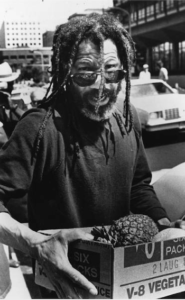
John Africa
*John Africa was born on this date in 1931. He was a Black radical and activist.
Born Vincent Leaphart in the Mantua neighborhood of West Philadelphia. His father, Frederick Leaphart, was a handyman, while his mother, Lennie Mae, was a homemaker. He was one of ten children. Lennie Mae died suddenly in her early 40s, and Africa later blamed the hospital for her death. As a child, he was "painfully thin" and underweight. At age 9, he was transferred to a school for slow learners to learn simple trades. He would continue to struggle in school and drop out at age 16.
Drafted by the US Army during the Korean War, Leaphart would serve over a year in an infantry unit. He would later remark on the contrast between the sunrise over the Korean mountains and the ugly gunfire of war. Upon his return, he met Dorothy Clark, and they were married shortly after that at 29. She would later describe their marriage as ordinary, and friends described Leaphart as levelheaded and dependable, noting that Dorothy would help him with his reading and writing skills. In 1971, they moved his family to the Powelton neighborhood in West Philadelphia, close to the University of Pennsylvania.
Community Housing Inc. was a cooperative in which members pooled money together to buy a handful of buildings to live in with the idea of rebelling against an oppressive society that bulldozed homes to make way to build more academic housing. Although the area had a large majority of academic residents, Leaphart was seen as eccentric yet tolerable as the area was diverse. Faced with foreclosure, the co-op stepped in and purchased his home so he could remain living there.
In 1972, Leaphart changed his name to John Africa to represent the continent where life began. He managed to attract people in the Philadelphia area who were willing to believe in his ideologies. He later met Donald Glassey, a social worker from the University of Pennsylvania, who was so intrigued by Africa’s teachings that he volunteered to write and compile illiterate Africa’s thoughts into a book. Glassey's notes were eventually the basis of "The Guidelines." With Glassey, Africa moved his new organization to a house on Pearl Street in West Philadelphia.
After parting ways with Glassey due to differing ideologies, Africa made "The Guidelines" the primary source for his teachings and the principles of MOVE, founded in 1972 as the Christian Movement for Life. The Guidelines articulated teachings such as strict vegetarianism and the inherent value of all living things. MOVE accepted members regardless of their past and taught lessons on corruption, racism, and the need for individuality in an increasingly technological society. Further, the organization protested animal cruelty in zoos, the education system, and police brutality. Consequently, the police engaged in heavy surveillance around members of MOVE.
On August 8, 1978, the Philadelphia police attempted to evict the MOVE organization from Pearl Street. A standoff occurred, resulting in an eventual shootout and the death of one police officer, James J. Ramp, as well as several injuries. Nine MOVE members were arrested, and the organization was removed from its home on Pearl Street. The home was immediately demolished, and the "MOVE 9" were convicted over the police officer’s death, and they remain in prison today. Glassey, after being found in possession of weapons, was later arrested. He implicated Africa and other MOVE members in various crimes.
On July 23, 1981, in the Philadelphia federal court, Africa and his co-defendant Alfonso Africa (representing themselves) were tried and acquitted on weapons and conspiracy charges by a jury that deliberated for almost six days. After MOVE and Africa moved to a new location on Osage Ave. in West Philadelphia, law enforcement officials obtained permission from the Mayor's office to evict MOVE members due to neighborhood complaints of obscenity and arrest warrants.
On May 13, 1985, they attempted to evict MOVE and execute arrest warrants. Non-compliance by MOVE developed into an armed standoff and firefight in which the Philadelphia Police Department fired over 10,000 rounds at the MOVE compound. During the raid, the Philadelphia Police Department head of bomb disposal, onboard a Pennsylvania State Police helicopter, dropped a satchel containing Tovex and C4-Explosive on the roof of the Osage Avenue home occupied by members of MOVE and five children without warning. The explosion ignited a visible can of gasoline on the roof and started a fire that destroyed 65 homes in the neighborhood. Despite hosing the building with high-power water cannons from a distance all morning, the Fire Chief agreed with the Chief Commissioner's suggestion to let the fire burn with the goal of letting a rooftop lookout cabin, or fortified bunker, burn. Eleven MOVE members died in the fire, including John Africa, five other adults, and five children.
Although the members were huddled in the basement with access to a back alley, the alley was under police gunfire. The lone surviving woman described bullets flying all around her during the first escape attempt, and the lone surviving child described hearing the sound of automatic gunfire when they tried to flee the fire. Participating officers claim this is incorrect. Only Ramona and Birdie Africa survived, but both were severely burned. Birdie was released, but Ramona was convicted and sentenced to serve a maximum sentence of 7 years in prison. She served the full time. Even though the Philadelphia Police Department and Fire Department were found guilty of negligence by the Philadelphia Special Investigation Commission (MOVE), no criminal charges were filed against any of the perpetrators of the bombing, arson, and murders.